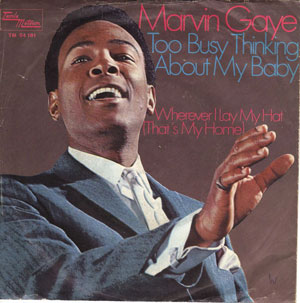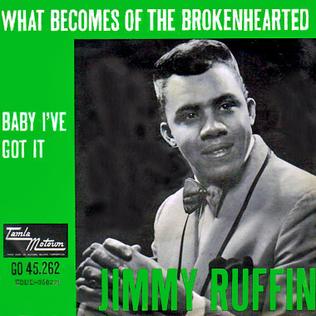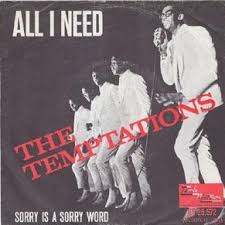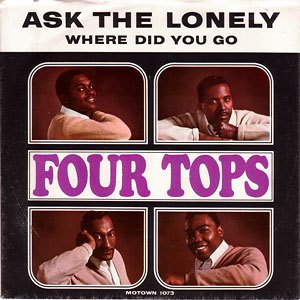Related Research Articles
The Andantes were an American female session group for the Motown record label during the 1960s. Composed of Jackie Hicks, Marlene Barrow, and Louvain Demps, the group sang background vocals on numerous Motown recordings, including songs by Martha Reeves & the Vandellas, the Temptations, Stevie Wonder, the Four Tops, Jimmy Ruffin, Edwin Starr, the Supremes, the Marvelettes, Marvin Gaye and the Isley Brothers, among others.

"Too Busy Thinking About My Baby" is a Motown song written by Norman Whitfield, Barrett Strong, and Janie Bradford. The song was first recorded by The Temptations as a track on their 1966 album Gettin' Ready. Eddie Kendricks sings lead on the recording, which was produced by Whitfield. Jimmy Ruffin also recorded a version with The Temptations providing background vocals in 1966. It remained unreleased until 1997.
"That's the Way Love Is" is a 1967 Tamla (Motown) single recorded by The Isley Brothers and produced by Norman Whitfield.

"What Becomes of the Brokenhearted" is a hit single recorded by Jimmy Ruffin and released on Motown Records' Soul label in the summer of 1966. It is a ballad, with lead singer Jimmy Ruffin recalling the pain that befalls the brokenhearted, who had love that's now departed. The song essentially deals with the struggle to overcome sadness while seeking a new relationship after a breakup.
"(We've Got) Honey Love" is a 1967 song by Motown girl group The Velvelettes that later became a 1969 single released by another Motown girl group Martha and the Vandellas from their album Ridin' High released in 1968. The song returned the Vandellas to the top forty of Billboard's R&B singles chart where it peaked at number twenty-seven while it hit the Billboard Hot 100 peaking at number fifty-seven. It was the group's sixth record where they were listed as Martha Reeves and the Vandellas following the successful "Honey Chile" single two years earlier. The song talked of how one woman's lover's charm was like "sugar and spice" adding names of candy and soda adding "a little bit of me, a little bit of you and we've got honey love." The Velvelettes, meanwhile, had recorded two versions of the song, both of which would go unreleased for almost 40 years. All three versions were written by Richard Morris and Sylvia Moy, and produced by Morris. Every version also used the same track with The Andantes as background vocals.

"For Once in My Life" is a song written by Ron Miller and Orlando Murden for Motown Records' Stein & Van Stock publishing company, and first recorded in 1965.

"Shoo-Be-Doo-Be-Doo-Da-Day" is a 1968 single released by American and Motown recording artist Stevie Wonder. The song, co-written by Wonder and produced by Henry Cosby and Sylvia Moy, was the first to showcase Wonder's talents at the clavinet and was one of his first successful co-written tracks during his 1960s Motown period. The song reached number nine on the Billboard Hot 100 pop singles chart in 1968, and went to number one on the R&B chart.

Lost and Found: You've Got To Earn It (1962–1968) is a compilation album by The Temptations. Released by Motown Records in 1999, it includes twenty unreleased Temptations records alongside unreleased mixes of "Ain't Too Proud to Beg" and "You've Got to Earn It". Most of the songs were recorded during the group's "Classic 5" era with David Ruffin and Eddie Kendricks as lead singers, although there are some tracks present which were recorded with Ruffin's predecessor, Elbridge Bryant, in the lineup. There's also one track that was recorded with Ruffin's successor, Dennis Edwards.

"All I Need" is a 1967 hit single recorded by The Temptations for the Gordy (Motown) label. It is the group's first single to be produced by Norman Whitfield's protégé Frank Wilson. Written by Wilson, Edward Holland, Jr. and R. Dean Taylor, the single was a Top 10 hit on the Billboard Hot 100, peaking at number 8; it was also a number-two hit on the Billboard R&B singles chart.
"It's Growing" is a 1965 hit single by The Temptations for the Gordy (Motown) label. Written by Miracles members Smokey Robinson and Pete Moore and produced by Robinson, the song was a top 20 pop single on the Billboard Hot 100 in the United States, on which it peaked at number 18. On Billboard's R&B singles chart, "It's Growing" peaked at number 3.
"What's Easy for Two Is Hard for One" is a song written and produced by Smokey Robinson and released as a single by singer Mary Wells for the Motown label.
"I Couldn't Cry If I Wanted To" is a 1962 Motown song written by Edward Holland, Jr. and Norman Whitfield. It would later be released as B-sides for singles by The Temptations and Holland himself, both of which were produced by Whitfield.
"Everybody Needs Love" is a 1964 Motown song by Norman Whitfield and Edward Holland, Jr.. The first version released was by The Temptations for their album The Temptin' Temptations in 1965, but the most successful version was on a single by Gladys Knight & the Pips, which peaked at #39 on the Billboard Hot 100 chart, and #3 on the Billboard R&B singles chart, in 1967. Other Motown acts that recorded this song were Mary Wells, which featured Eddie Kendricks of The Temptations in the background, Jimmy Ruffin, The Velvelettes, and The Miracles. All versions of the song were produced by Whitfield.

"Ask the Lonely" is a soul/pop ballad recorded by Motown singing group the Four Tops. Released as the group's third single, the single became the group's second successful single ever since signing to Motown in 1963. Released in 1965, the song rose to number 24 pop and number 9 R&B. It's notable for it being co-written by longtime Motown staffer Mickey Stevenson as most of the group's hits on Motown were written and produced by Holland-Dozier-Holland. It's also notable for lead singer Levi Stubbs' emotional lead and The Andantes helping the other Tops in the background.

"Still Water (Love)" is a 1970 hit single written by Smokey Robinson and Frank Wilson for the Motown singing group Four Tops. The B-side was "Still Water (Peace)" and both songs appear on the 1970 album Still Waters Run Deep.

Love Supreme is a 1988 compilation album by The Supremes, released on the Motown label. The album peaked at number ten in the UK and was awarded a silver disc for sales in excess of 60,000 copies.
"Together We Can Make Such Sweet Music" is a 1967 song co-written by Richard Drapkin and Marty Coleman. In 1968 it was assigned to Artie Fields' Top Dog label in Detroit and issued as a 45 by rhythm and blues singer Joe Towns.
"Just One Last Look" is a 1966 song written and produced by Motown's main production team Holland–Dozier–Holland, and recorded by The Temptations for the Gordy (Motown) label, and The Four Tops for the main Motown label. Intended for release as a single for both, it was blocked from doing so and shelved.
"Too Hurt to Cry, Too Much in Love to Say Goodbye" is a 1963 song and single written and composed by Motown's main production team Holland–Dozier–Holland. Credited to the Darnells the performers on both sides of the single were in fact the Andantes, Holland–Dozier–Holland, Mary Wilson of the Supremes (B-side), and members of the Marvelettes, the Four Tops, and the Temptations. Nobody involved with the production on either side was pleased with the false credit. Whatever the reason it was done, it didn't work as the single only peaked at 17 on the Billboard Bubbling Under Hot 100 charts.
"Say You" is a 1965 soul song, written by Robert Dobyne, Robert Staunton and Charles Jones, and recorded by both The Monitors, who had a charting R&B Hit with the song, and The Temptations.
References
- ↑ "Don't Forget the Motor City". Dftmc.info. Retrieved 2016-10-02.CS1 maint: discouraged parameter (link)
- ↑ Andrew Hamilton (2013-11-05). "Just Another Lonely Night - The Temptations | Song Info". AllMusic . Retrieved 2016-10-02.CS1 maint: discouraged parameter (link)
- ↑ Just Another Lonely Night at Discogs
- ↑ The Complete Motown Singles Vol. 9: 1969 [liner notes]. New York: Hip-O Select/Motown/Universal Records